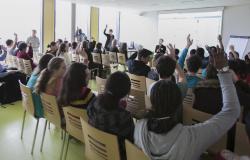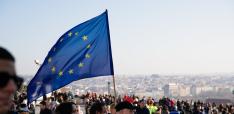Charta 2020: A Charter of European Public Goods

To mark Europe Day, 2019 – Charta 2020 is a vision for a democratic and egalitarian European Union, and a demand to recognize 20 European public goods that are essential to the reshaping of any future European political space.
The Agora Europe Series is proud to present Charta 2020, the first charter of European public goods. Charta 2020 is a vision for a democratic and egalitarian European Union and a demand to recognize 20 European public goods essential to reshaping any future European political space. It outlines the conditions for European integration across 20 public goods that we Europeans should endorse to make Europe a better and safer place for all citizens and residents. By definition, a public good is a good that eludes both rivalry and exclusion, a good made available for everyone, such that no one will be competing with another for them, nor be excluded from their use. Charta 2020 is promoted by Agora Europe and several other organisations and has been collectively written by many international activists and academics ( see below for full list) at the European University Institute on February 15, 2019 and presented at the European Parliament on March 20, at the Italian Chamber of Deputies on April 16, at Maastricht University on April 29 before the Spitzenkandidaten debate, and at Columbia University on May 8. The transnational joint launch of #Charta2020 is scheduled for Europe Day on May 9, 2019.
Charta 2020
A Charter of European Public Goods
We, the citizens of Europe, believe that our European unity and our citizenship are intertwined and do not rest solely on fundamental individual rights or on treaties between democratic states, but on some more basic and concrete public goods, which ask to be defined, declared and protected. This has been the very purpose of the European Union since its inception: to create and sustain through time some vital public goods and promote them globally.
By definition, a public good is a good that eludes both rivalry and exclusion; a good made available to everyone so that their enjoyment does not rest on competition and does not involve exclusion. Public goods are predicated on the principles of non-exclusion and non-rivalry. This amounts to saying that even those parts of a society that have not directly participated in the definition and actualization of these public goods can benefit from them.
Charta 2020 defines some of the main European public goods. We believe they are at the heart of Europe’s purpose and its commitments towards its citizens. We think they should become an object of debate at all levels of society in Europe. This Charter offers a new frame of discussion to elaborate and propose a new agenda for the EU in the next decade. It advocates a renewed EU commitment by enabling its citizens to collectively create and sustain those public goods that underpin their commitment to the European project.
An essential of self-government, public goods could through time become objects of our political desire. Today, this aspiration is stifled by technocratic governance from above and by ethno-nationalism from below. Against both agendas we believe that the discussion on the European public goods belongs to the arena of politics. It belongs to the EU political space and to us citizens as its primary actors.
Section 1: European public space
- Political Europe
Europe is a political space. The provision of public goods depends on it. The institutional recognition of the integrated nature of the European polity is the necessary premise for the stable provision of public goods to the benefit of all European citizens. The institution of the European political space depends on a generation of citizenship beyond norms and treaties and on our reconceptualization of borders. While the construction of genuine transnational and democratic institutions will take time and effort, empowering new practices is a task within immediate grasp. Additionally, the sustainability of our common civic and economic space will only be ensured if we allow ourselves to be protagonists of a political sphere of discussion that is rich in ideas and open to dissent, uniting the member-states horizontally and vertically: through their porous borders and from the local levels up to Brussels. European citizens deserve a genuinely transnational representation through which to claim and advocate for essential public goods. European citizens ought to have enhanced direct participation in the European political process.
2. European Citizenship
European citizenship creates a bond between the European Union and its citizens that is defined by rights and duties, participation, and belonging to a common political space. These rights – economic, social and political – concern not just those people who exercise their freedom of movement in another member-state but all the EU citizens as such. Yet still today, the recognition of these rights remains fragmented, incomplete and fragile. To offer a solid basis for sustainable integration of Europe, EU rights must be defended, unified and made permanent by opening up the application of the Charter of Fundamental Rights of the EU and allowing for a more equal and direct access to justice for all citizens and residents. Permanent legal residents in the European territory must be granted as much participation as possible at every level for the government of common interests and the protection of their rights.
3. European Democracy
The democratic legitimacy of the EU derives not only from representative democracy but is also secured by participatory and deliberative democracy. Citizens are therefore called upon not only to contribute through the electoral process to the government of the EU, but also through their day-to-day participation in EU processes as expressed in public consultations, EU citizens initiatives and campaigns, petitions to the European Parliament, complaints to the EU Ombudsman and other avenues of participation. Access to these avenues must be promoted so as to equalize access to the EU political process. In addition, to set up a European political space calls for the emergence of genuinely transnational parties and movements. Democratic politics goes beyond mere institutions and involves mutual horizontal openings of national publics and bottom-up practices of associations, unions and citizens.
4. Peace and Right of Hospitality as a Shared Responsibility
Europe is based on principles of peace and reconciliation. This idea developed as a reaction against totalitarian and despotic states and achieved momentum with the end of the Second World War. Since then, the European political space has been dedicated to the promotion of solidarity and responsibility as its ultimate public goods. To be lasting, peace needs to be sought not just within the continent but also externally. It requires not just state-to-state engagements within Europe but also global engagement outside Europe across frontiers. The development of political institutions within a network of international law has been the primary condition for further commitment to a civil culture of good will, generosity, and hospitality. There must be coherence between the internal and external dimensions of EU actions. Defensive alliances cannot be ruled out in a world of conflicts and potential threats, but they must be redefined in order to exclude expansionist policies and the arbitrary definition of collective enemies. This ensures that the European project is not about the projection of EU values, but about their universalization within and outside EU borders. From the time of Ulysses’ travels, hospitality and inclusiveness are at the heart of our shared culture and can be extended beyond EU borders on the basis of a shared responsibility. In a world where there are a growing number of stateless people, the practical commitment to these principles requires the creation of an International Humanitarian Passport. This can be issued in cooperation with the United Nations’ High Commission for Refugees. It can ensure that people who for reasons of health, age, necessity and vulnerability are at risk can secure a safe haven in the EU.
Section 2: Migration
5. Freedom of Movement
Freedom of Movement means the right to choose, for all individuals on European soil, a safe location in which human rights, including social and economic rights, are fully guaranteed and respected. These rights are universal and inalienable. They have to be combined with respect for humanity, dignity and solidarity.
6. Sea Rescue and European Solidarity
Given the number of deaths of migrants occurring at the borders of Europe and in the Mediterranean Sea, search and rescue measures must be the first priority of European action. These measures must be funded from European budgets and be in full compliance with obligations within the relevant maritime and human rights conventions. Search and rescue missions must be fast, effective, and expeditious. On the principle of European solidarity, the responsibility for reception of those rescued and landed must then be shared by all the European member-states. Those rescued must be supported, and not subject to criminalization or other mistreatment.
7. Common European Asylum System
The Common European Asylum System must allow asylum seekers and refugees to move freely within the European space. This system should be guided by the principle of integration with full recognition of economic and social rights. The adopted framework should seek to enlarge the protection of all those in the European space and to guarantee safe passage and assistance, in the context of environmental and geopolitical global evolution.
8. North-South Cooperation Across the Mediterranean Space
The security paradigm should not be the foundation for the external dimension of European migration and asylum policy. The lawful basis of asylum and migration practices should be grounded in a dialogue between the countries of origin, transit and destination. It should also highlight the responsibilities and key role of regional integration players and supranational actors. Policy makers can in this way enhance their understanding of the process of migration, thus enabling them to adapt policy frameworks for the future in a way that is both practically relevant and ethically sound, with an eye to developing sustainable legal pathways to migration that take full account of the geopolitical realities of the day.
Section 3: Economy
9. European Workers Compact
Europe remains a highly uneven economic space: workers in some regions benefit from decent wages, conditions, and pensions, while workers in other regions lack access to the most basic living wages. Capital, operating across the Single Market, can exploit these differences to drive a race to the bottom as member-states chase investment. The European Workers Compact sets a new EU standard for wages and working conditions that applies to all workers, regardless of age, gender, or immigration status, and it sets the criteria for their harmonization across the European Union. Only by building worker power evenly across the EU can we make European citizenship meaningful in the economy.
10. Universal Basic Services
A crisis of poverty persists in large pockets of the European Union, with 118 million people lacking access to basic services like food, water, healthcare, and shelter. The EU can commit to eradicating poverty by guaranteeing these services universally. These efforts would constitute a welfare state at the European level, setting standards for basic services and investing necessary resources to member-states in order to achieve them.
11. Green Public Investment
Austerity has starved Europe of investment and sustained its crisis of unemployment. A massive Green Investment Program can both end the regime of austerity and unleash an EU-wide green transition to a zero-carbon economy, creating millions of green jobs in industry, agriculture, and infrastructure. Europe should seize the opportunity to lead the world in an ecological revolution.
12. Tax Justice Authority
The last three decades have seen a sharp rise in wealth inequality across Europe. This transformation is largely by design: Europe is riddled with tax loopholes and haven jurisdictions – an affront to the principle of solidarity. The EU should empower a common Tax Justice Authority that will set the guidelines to eliminate tax havens and illuminate Europe’s banking sector, recovering fiscal resources for member-states and restoring trust in a shared European citizenship.
Section 4: Culture
13. Culture and Data
Democratic tradition requires that cultural production, artefacts and intellectual resources are accessible to all and widely diffused across Europe, to be discovered and explored freely in their richness. Cultural freedom and freedom of speech, the press and association must be guaranteed. Europe should protect culture from the worst effects of the market and support independent cultural production. Europe’s model of new technologies should not only put citizens in control of the use of both their personal and non-personal data, but also employ these data and intellectual property regimes to fuel innovation rather than protect incumbents.
14. Education
Across the centuries, the history of Europe is interwoven with its educational traditions: paideia, cultura animi, studia humaniora and Bildung have been the precious treasures which have shaped our ideas of human being. Europe is a learning community where education is the principal tool for inheriting critically our common past and for living actively our common future. In this framework, we strongly assert an education built on these important pillars: relation through dialogue, social and individual emancipation, tolerance, critical thinking, difference as a positive ideal. High quality instruction requires investment, and society as a whole benefits from universal free access to public and equal education in a long-life learning perspective.
15. Cultural Heritage
The core of European heritage is diversity. It encompasses many aspects, including our different languages, landscapes, paintings, music, ways of life, styles of thinking and of having fun. The European Union should preserve and improve this richness of different habits and ideals: it is a public good in which everyone can recognize herself in an open process. Each culture can be conjoined without losing different identities in order to produce new ways of living together: different approaches can lead towards a future which is up to the challenges of modernity. Europe can symbolize the fragile but powerful possibility of caring for a multifaceted whole including different cultures.
16. Processes of Emancipation and Autonomy in Europe
European culture is characterized throughout its history by a continuous recomposition of the political space, determined by new subjects that demand to be taken into consideration: the fights of workers, of women, for recognition of minorities, for equality and for sexual and gender freedom (for example) characterize European culture as a process of emancipation. Social and economic transformations lead to ever new movements of self-determination which are characterized by cultural elements and innovations. Europe should be an emancipatory project and promote the cultural projects of these new subjectivities.
Section 5: Environment
17. Equal Rights and Dignity for Humans, Animals and Plants
Life on earth is threatened by our system of production, based on limitless growth on a finite planet. Fighting climate change requires: switching to renewable energies and high energy efficiency models, decarbonization, protecting biodiversity, soil, water, securing safe air quality, and promoting innovative and existing technologies focused on using natural resources responsibly. By involving workers, minorities, young people and women’s perspective on care in an ecological revolution, Europe can create green and quality jobs and thereby a system of production that ensures the flourishing of humans and nonhuman nature.
18. Food Production and Health
We need new rules to redirect the subsidies towards organic agriculture patterns. A radical change in rules and financial priorities is the only way to reduce emissions and use of pesticides. Industrialized food production, agriculture and farming are responsible for 20% of CO2 emissions world-wide. New EU legislation is thus required to stop the exhaustion of soil, urban sprawl, land-grabbing and overfishing, free the sea from plastic, and preserve the restorative power of landscapes.
19. Critical and Responsible Consumption
Modifying our lifestyle to develop human capabilities and social relations must take precedence over material wealth. We need a circular economy (zero waste) and an enhancement of local production and consumption (zero km). This includes fair trade with countries outside the EU and redressing country-city inequalities. Additionally, in order to achieve long-term decarbonization, the Paris Agreement needs to be implemented as well as enhanced.
20. Fight Inequalities, Ensure Equal Access to Resources
Fighting inequalities and ensuring equal access to resources imply repaying the ecological debt of the Global North towards the Global South, which is also one of the causes of forced migration. Carbon pricing has to be based on the redistribution of wealth that ensures that countries in the Global South are supported in reducing their emissions and developing their economy. Benefits and costs of the transition to an ecological economy must be divided fairly. Costs should be levied in a progressive fashion that does not contribute to further inequality or precarity within or across EU member-states. A fundamental transformation towards a more efficient use, reuse and recycle of our production and consumption patterns is necessary.
Project Coordinators
Caterina Di Fazio and Rui Tavares
Sections and Section Coordinators
- European Political Space Étienne Balibar, Caterina Di Fazio, Nadia Urbinati
- Migration Souleymane Bachir Diagne, Daniel Innerarity, Satvinder Juss
- Economy David Adler, Lorenzo Marsili, Claus Offe
- Culture Alberto Alemanno, Niccolo Milanese, Kalypso Nicolaïdis
- Environment Elena Pulcini, Nora Räthzel, Miguel Vatter
Contributors
Intro. Alberto Alemanno, Caterina Di Fazio, Kalypso Nicolaïdis, Rui Tavares, Nadia Urbinati, Frédéric Worms
- Etienne Balibar, Caterina Di Fazio, Michele Fiorillo, Lorenzo Marsili, Petar Markovic, Gian Giacomo Migone, Kalypso Nicolaïdis, Teresa Pullano, Andrea Sangiovanni, Philippe Schmitter, Rui Tavares, Nadia Urbinati
- Cristina Blanco Sío-López, Mattia Ciampicacigli, Andrea Costa, Caterina Di Fazio, Souleymane Bachir Diagne, Daniel Innerarity, Satvinder Juss, Cécile Kyenge, Virginie Lefèvre, Marco Maddalena, Titus Molkenbur, Sara Prestianni
- David Adler, Emanuele Felice, Lorenzo Marsili, Gian Giacomo Migone, Claus Offe, Peppe Provenzano, Philippe Schmitter, Nadia Urbinati
- Alberto Alemanno, Carlo Cappa, Paola Giacomoni, Alexandra Jouclard, Niccolo Milanese, Kalypso Nicolaïdis, Pasquale Terracciano, Carlo Varotti, Giulia Valpione
- Suzana Carp, Monica Frassoni, Darian Meacham, Elena Pulcini, Nora Räthzel, Valentina Sardella, Miguel Vatter
This post first appeared on:
Image credit: United States Mission Geneva via Flickr (CC BY-ND 2.0)



